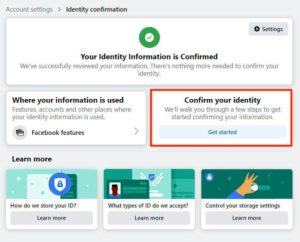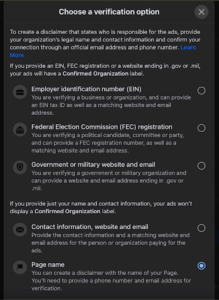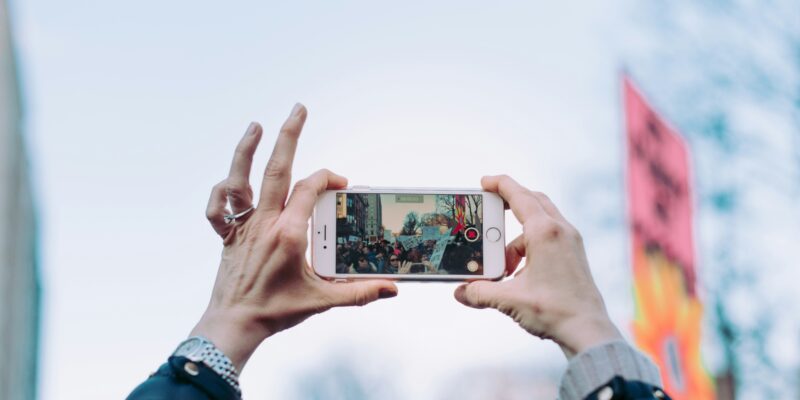
Navigating Digital Ads During an Election Cycle
We’re excited to share this guest post from Obet Montalvo and Salim Shariff, two esteemed colleagues with whom we’ve had the privilege of collaborating over the past few months. Together, we’ve been working to enhance our partners’ digital communications and advocacy capacity through a combination of trainings, consulting projects, and hands-on assistance. This partnership reflects our commitment to empowering the next generation of leaders with the tools they need to amplify their advocacy, engage in effective digital organizing, and navigate the rapidly evolving digital landscape. It also reflects ReThink’s longstanding commitment to drive collaboration and innovation through shared data and learning.
Most recently, we collaborated on a digital skills training for young communicators across the democracy space where participants acquired essential skills for engaging politically-active audiences, amplifying messages, and driving action — all while staying compliant with the rules and regulations around political advertising. In this guest blog, Obet and Salim build on some of the insights shared in our recent training on digital strategy and advertising, particularly in navigating the complexities of digital engagement during an election year.
We are grateful for their dedication and ongoing partnership. We hope this post offers valuable perspectives for communicators and advocates working nationwide on digital engagement efforts. And we hope it inspires further exploration of how digital skills can enhance your work, especially in a critical election year like this one.
Best Practices for Running Digital Ads During Elections
Google & Meta represent the two platforms with the most effective ad inventory for non-profits. That’s because both are purpose-built towards conversion-based direct response marketing (as in, ads to encourage donations, event RSVPs, sales, issue-based petition signatures, and other direct actions).
As such, if your organization has limited budgets and time, we recommend focusing on these two platforms. With GOTV on the horizon, most organizations are focused on conversations with voters, voter registration, identifying supporters, and turnout.
Despite this, most ads will be best for building your email list and grassroots fundraising. Ads can help mobilize voters, but they typically require very large budgets to break through and see impact.
For that reason, we encourage organizations without massive budgets to focus their goals on list building around commit / make a plan to vote on ad campaigns.
Typical cost per signups for these types of campaigns range from $2 to $10, so budget accordingly. Whenever possible, target the broadest possible audience to maximize the power of Google & Meta’s algorithms, and make sure the Google & Meta conversion pixels are installed properly on your landing page, or consider using their platform-specific forms.
Verification of Personal Account for Meta (Facebook & Instagram) Ads
Meta requires individuals placing political ads for an organization/candidate to verify their personal accounts. Before you start the process you will need the following:
- Be an Admin for the Page you’re planning to run ads from.
- Have two-factor authentication enabled on your personal Facebook account.
- Have either a US passport, license, or ID and a US-based mailing address.
Once that’s done you can begin the process to verify your account:
- Log into your Facebook Account
a. Make sure you’re using the personal account that will manage political ads. You cannot complete the verification process without being logged in. - Go to https://www.facebook.com/id/hub/

- Click Confirm your identity and select Running ads about social issues, elections or politics.
- Select United States as the country you’ll be running ads from, then click Get Started
- Select Confirm your primary country / region.
- Select the type(s) of identification you’d like to use. Facebook should let you know if the ID is acceptable.
- Click Finish.
- Wait for Confirmation.
- The review process can take a few days, and keep in mind you might also be required to submit a notarized form with your documents — we recommend going to UPS if you don’t have a notary handy.
Verification of Organization for Ads (Disclaimer)
- Entities running political ads must have a disclaimer indicating who is paying for them.
- To begin this process, head to your page and “act as your page” on Facebook by switching accounts.
- Then head to https://www.facebook.com/settings/?tab=authorizations
- On this page, after you’re personally verified, you’ll be able to “create a disclaimer.”
- Meta will present you with numerous options to verify the organization. We’ll want to choose the quickest option.
- First, click “see more”, then select “page name”. At this point, you’ll be asked to enter an email address and phone number associated with the organization, both of which will receive verification codes that must be inputted within a certain period of time.
- After you enter the verification codes, Meta will take between 24 and 72 hours to verify the disclaimer, after which, ads can begin running!

Blackout Period
Meta enforces a blackout period before an election, in which no new ads can be placed. Meta’s Blackout Period is October 29 – November 5, 2024. Below are some tips to structure your campaigns around these periods to make sure you’re still serving ads during this crucial time:
- Plan Ahead: Schedule any campaigns well ahead of time to ensure they are up and running before the blackout begins. Ads that are live before the blackout will continue to run, even during the blackout period.
- All ads must be approved by the platform and running before the blackout begins.
- Submit ads at least 7-10 days ahead of the blackout to allow time for the Meta review and approval process.
- Monitor Performance: Review your ad performance closely before the blackout to make any necessary adjustments to targeting, creative, or budget. Once the blackout starts, new changes or edits to ad creative, targeting, and copy are not allowed, so make sure you make any final adjustments before the blackout starts.
- Leverage other channels: In addition to your pre-scheduled ads, use this time to leverage organic social media, email, and SMS to make sure you’re still hitting your audience before Election Day!
Platform by platform political ad policies
| Platform | Allows Political Ads? |
| Facebook & Instagram | Yes |
| YouTube & Google Ads | Yes, with restrictions |
| TikTok | No |
| X (Twitter) | Yes, with restrictions |
| No | |
| No | |
| Snapchat | Yes, with restrictions |
| Yes, with restrictions | |
| No |
Ads Library
Ads libraries are meant to allow transparency by providing public access to active and past ads from any entities running political ads. They are a great resource to review ads from other organizations in the movement space and follow trends in messaging and tactics. Here’s how to navigate and use ads libraries from major platforms like Meta, Google, Snapchat, Twitter/X, and Roku:
Meta (Facebook & Instagram) Ads Library
- Go to https://www.facebook.com/ads/library/
- Select the country where the ads are running and Issues, elections or politics before searching for a keyword or FB/IG page you want to see ads from
Google Ads Library
- Go to https://adstransparency.google.com/political?region=US&topic=political
- This page will automatically filter for US political ads so just search for the advertiser you’re looking for
Snapchat Political Ads Library
- Snapchat does not have a full “ads library,” instead providing a CSV of data for active political advertisers on the platform:
- Go to https://snap.com/en-US/political-ads
- Select the year for which you want data and download the CSV
Continued Education Resources
In addition to the above, you can stay informed on the latest trends and best practices in digital advertising by following some of the experts, newsletters, and organizations below:
- Take advantage of Google’s free ad grants program, which provides up to $10,000 a month in free advertising on Google Search!
- Jon Loomer – an essential resource for orgs looking to optimize advocacy campaigns on Meta, includes more advanced FB/IG advertising strategies.
- Neil Patel – offers comprehensive guides and tools on digital marketing strategies, including SEO, ads, and content marketing.
- FWIW – a newsletter that tracks digital spending, strategy, and trends in US elections.
- Center for Digital Strategy – A convener and training organization focused on supporting small non-profits in the US.
- Campaigns & Elections – while very geared towards marketing firms and consultants, there are tidbits of good info now and again.
- nten.org – a non-profit technology convener with paid courses and some free content.
- arena.run/toolbox – In addition to fantastic training (geared towards electoral politics), Arena has a lot of free resources on their website.
- National Democratic Training Committee – geared towards down ballot campaigns, there are still tremendous free resources here for how to run a smart digital program.
- Re:power – paid training organization for staff in digital and data.
- Ever feel stuck with a particular ads issue? Try googling your issue and add “reddit” to your search—tons of marketers support each other on Reddit!
Remember, the key to success for running digital ads during this time is preparation—ensure that your ads are compliant, your verification processes are complete, and your campaigns are set up well in advance of critical deadlines like Meta’s blackout period. With thoughtful planning and strategic use of Google and Meta’s powerful tools, your organization can make the most of digital advertising to mobilize your audience and support your cause during this pivotal time. Continue learning, stay adaptable, and make the most out of your digital campaigns this election season!
**Addendum – October 18, 2024**
Google will block election ads across all of its platforms after the last polls close on Nov. 5.
About the authors
Salim Shariff is a father, award-winning digital and communications strategist, and trainer with 13 years of digital experience. He’s managed multi-million dollar ad buys, raised millions of dollars online for progressive causes and candidates, and driven hundreds of thousands of people to take action online and off.
Obet Montalvo is a digital strategist and photographer based in Houston, Texas, with experience in electoral campaigns, Latinx coalition-building, and digital organizing across the South and Southwest. He has built and led digital programs for statewide campaigns and national organizations, overseeing email, website design, visual branding, and paid media in both English and Spanish.


